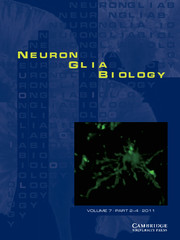Crossref Citations
This article has been cited by the following publications. This list is generated based on data provided by
Crossref.
Magnaghi, Valerio
Procacci, Patrizia
and
Tata, Ada Maria
2009.
Vol. 87,
Issue. ,
p.
295.
De Couck, Marijke
Mravec, Boris
and
Gidron, Yori
2012.
You may need the vagus nerve to understand pathophysiology and to treat diseases.
Clinical Science,
Vol. 122,
Issue. 7,
p.
323.
Corsetti, V.
Mozzetta, C.
Biagioni, S.
Augusti Tocco, G.
and
Tata, A.M.
2012.
The mechanisms and possible sites of acetylcholine release during chick primary sensory neuron differentiation.
Life Sciences,
Vol. 91,
Issue. 15-16,
p.
783.
Ferretti, M.
Fabbiano, C.
Di Bari, M.
Ponti, D.
Calogero, A.
and
Tata, A.M.
2012.
M2 muscarinic receptors inhibit cell proliferation in human glioblastoma cell lines.
Life Sciences,
Vol. 91,
Issue. 21-22,
p.
1134.
Marinelli, Sara
Vacca, Valentina
Ricordy, Ruggero
Uggenti, Carolina
Tata, Ada Maria
Luvisetto, Siro
Pavone, Flaminia
and
Premkumar, Louis S.
2012.
The Analgesic Effect on Neuropathic Pain of Retrogradely Transported botulinum Neurotoxin A Involves Schwann Cells and Astrocytes.
PLoS ONE,
Vol. 7,
Issue. 10,
p.
e47977.
De Angelis, Federica
Bernardo, Antonietta
Magnaghi, Valerio
Minghetti, Luisa
and
Tata, Ada Maria
2012.
Muscarinic receptor subtypes as potential targets to modulate oligodendrocyte progenitor survival, proliferation, and differentiation.
Developmental Neurobiology,
Vol. 72,
Issue. 5,
p.
713.
Stefano, M. Egle De
Toni, Francesca
Orazi, Valerio D’
Ortensi, Andrea
and
Tata, Ada Maria
2013.
Therapeutic approaches enhancing peripheral nerve regeneration.
Advances in Bioscience and Biotechnology,
Vol. 04,
Issue. 06,
p.
53.
Cao, Jianhua
Cheng, Xinghai
Zhou, Zhengming
Sun, Huiqing
Zhou, Feng
Zhao, Jing
Liu, Yonghua
and
Cui, Gang
2013.
Changes in the Foxj1 expression of Schwann cells after sciatic nerve crush.
Journal of Molecular Histology,
Vol. 44,
Issue. 4,
p.
391.
Ferretti, Michela
Fabbiano, Cinzia
Bari, Maria Di
Conte, Claudia
Castigli, Emilia
Sciaccaluga, Miriam
Ponti, Donatella
Ruggieri, Paola
Raco, Antonino
Ricordy, Ruggero
Calogero, Antonella
and
Tata, Ada Maria
2013.
M2 receptor activation inhibits cell cycle progression and survival in human glioblastoma cells.
Journal of Cellular and Molecular Medicine,
Vol. 17,
Issue. 4,
p.
552.
Faroni, Alessandro
Castelnovo, Luca Franco
Procacci, Patrizia
Caffino, Lucia
Fumagalli, Fabio
Melfi, Simona
Gambarotta, Giovanna
Bettler, Bernhard
Wrabetz, Lawrence
and
Magnaghi, Valerio
2014.
Deletion of GABA‐B Receptor in Schwann Cells Regulates Remak Bundles and Small Nociceptive C‐fibers.
Glia,
Vol. 62,
Issue. 4,
p.
548.
Uggenti, Carolina
De Stefano, M. Egle
Costantino, Michele
Loreti, Simona
Pisano, Annalinda
Avallone, Bice
Talora, Claudio
Magnaghi, Valerio
and
Tata, Ada Maria
2014.
M2 muscarinic receptor activation regulates schwann cell differentiation and myelin organization.
Developmental Neurobiology,
Vol. 74,
Issue. 7,
p.
676.
Pacini, Luca
De Falco, Elena
Di Bari, Maria
Coccia, Andrea
Siciliano, Camilla
Ponti, Donatella
Pastore, Antonio Luigi
Petrozza, Vincenzo
Carbone, Antonio
Tata, Ada Maria
and
Calogero, Antonella
2014.
M2muscarinic receptors inhibit cell proliferation and migration in urothelial bladder cancer cells.
Cancer Biology & Therapy,
Vol. 15,
Issue. 11,
p.
1489.
Wang, Youhua
Zhou, Shiran
Xu, Hua
Yan, Shixian
Xu, Dawei
and
Zhang, Yi
2015.
Up-Regulation of NF45 Correlates with Schwann Cell Proliferation After Sciatic Nerve Crush.
Journal of Molecular Neuroscience,
Vol. 56,
Issue. 1,
p.
216.
Abbas, Ozan L.
Borman, Hüseyin
Uysal, Çağri A.
Gönen, Zeynep B.
Aydin, Leyla
Helvacioğlu, Fatma
Ilhan, Şebnem
and
Yazici, Ayşe C.
2016.
Adipose-Derived Stem Cells Enhance Axonal Regeneration through Cross-Facial Nerve Grafting in a Rat Model of Facial Paralysis.
Plastic & Reconstructive Surgery,
Vol. 138,
Issue. 2,
p.
387.
Marinelli, Carla
Bertalot, Thomas
Zusso, Morena
Skaper, Stephen D.
and
Giusti, Pietro
2016.
Systematic Review of Pharmacological Properties of the Oligodendrocyte Lineage.
Frontiers in Cellular Neuroscience,
Vol. 10,
Issue. ,
Cobianchi, Stefano
Jaramillo, Jessica
Luvisetto, Siro
Pavone, Flaminia
and
Navarro, Xavier
2017.
Botulinum neurotoxin A promotes functional recovery after peripheral nerve injury by increasing regeneration of myelinated fibers.
Neuroscience,
Vol. 359,
Issue. ,
p.
82.
Piovesana, Roberta
Melfi, Simona
Fiore, Mario
Magnaghi, Valerio
and
Tata, Ada Maria
2018.
M2 muscarinic receptor activation inhibits cell proliferation and migration of rat adipose‐mesenchymal stem cells.
Journal of Cellular Physiology,
Vol. 233,
Issue. 7,
p.
5348.
Lucianò, Anna Maria
Mattei, Francesca
Damo, Elisa
Panzarini, Elisa
Dini, Luciana
and
Tata, Ada Maria
2019.
Effects mediated by M2 muscarinic orthosteric agonist on cell growth in human neuroblastoma cell lines.
Pure and Applied Chemistry,
Vol. 91,
Issue. 10,
p.
1641.
Piovesana, Roberta
Faroni, Alessandro
Magnaghi, Valerio
Reid, Adam J.
and
Tata, Ada Maria
2019.
M2 receptors activation modulates cell growth, migration and differentiation of rat Schwann-like adipose-derived stem cells.
Cell Death Discovery,
Vol. 5,
Issue. 1,
Piovesana, Roberta
Faroni, Alessandro
Tata, Ada Maria
and
Reid, Adam J.
2020.
Functional Characterization of Muscarinic Receptors in Human Schwann Cells.
International Journal of Molecular Sciences,
Vol. 21,
Issue. 18,
p.
6666.




